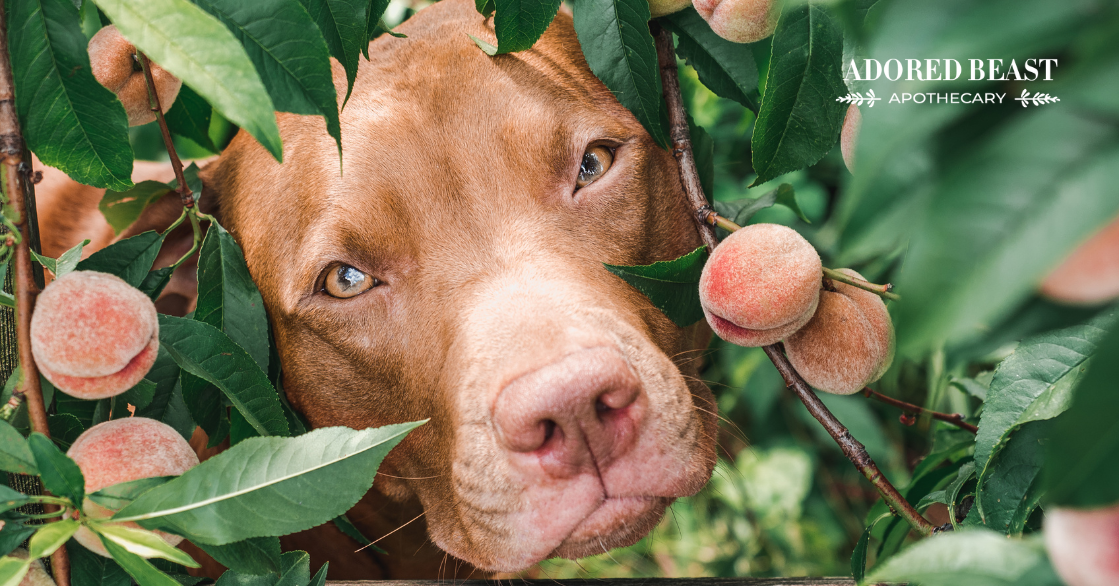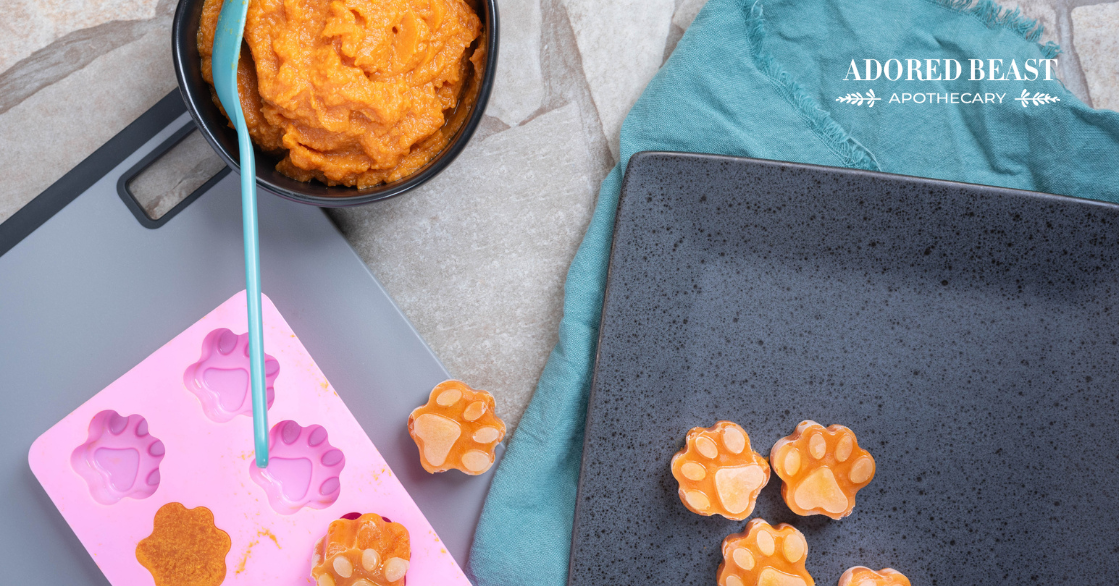More and more these days we’re hearing about the rise of canine kidney disease. In fact, it is a relatively common condition affecting our canine companions – estimates suggest 1 in 10 dogs will get it in their lifetime.
Our dogs’ kidneys have a very important role to play in the body. We want to do all that we can to keep them in good working order.
By paying attention to them now, and in the future, we can work to support our animals’ kidneys. And not just the kidneys – but all of the systems they’re connected to!
Herbs play an important role in dog kidney health. They provide us with a variety of benefits, targeted various bodily systems and helping protect these vital little organs.
So, in this post, our good friend, canine herbalist Rita Hogan, goes through some of her go-to herbs for kidney health!
Dog Kidney Health
The allopathic view of kidney function includes your dog’s renal system, consisting of two bean-shaped organs, the uterus, bladder and urethra. The kidneys control urine flow and work with the bladder to maintain fluids, communicate with bone marrow, and regulate red blood cell counts, especially when they are low.
Filtering blood is one of the main responsibilities of the kidneys. Metabolic wastes, chemicals, and toxins are excreted through urine and feces – this includes pharmaceutical drugs. The kidneys also process different chemicals and minerals like amino acids, glucose, phosphorus, nitrogen, potassium, and sodium.
Getting your dog’s blood levels checked is an important part of kidney monitoring. With balanced kidneys, your dog can keep up with filtration, regulate blood pressure, filter water-soluble toxins, and have healthy circulation avoiding stagnation.
When the kidneys are unbalanced, function declines and can lead to high sodium levels, blood pressure, low volume blood filtering, and fluid malfunction where you might see excessive drinking and urinating.
If left untreated, kidney imbalances can lead to kidney disease and eventually kidney failure through rapid scarring, which occurs as blood vessels (glomeruli) in the kidneys harden, causing protein leakage into the urine instead of remaining in the blood.
Traditional Symptoms of Canine Kidney Disease
There are several different conventional symptoms to look out for when it comes to canine kidney disease, including:
- bladder infection
- constipation
- edema (swellings)
- electrolyte imbalances
- excessive urination
- excessive thirst
- fatigue
- high blood pressure
- incontinence
- kidney infection
- lethargy
- loss of appetite
- nausea and vomiting
- protein in urine
- shortness of breath
- trouble sleeping
- urinary tract infections
When looking at your dog’s kidneys holistically, you’ll quickly see a different view of kidney-related disfunction because inside your dog’s body, everything is connected.
The kidneys govern moisture and help maintain circulation so organs are continuously bathed in blood, remaining sound. Dryness is one of the main kidney antagonists, leading to heat proliferation. Your dog’s body can’t cool itself without moisture. Too much heat can lead to protein accumulation in the urine.
Holistic Kidney Function
Looking at kidney function holistically considers the dog an ecosystem, and the kidneys are far reaching. In holistic herbalism, Traditional Chinese Medicine, and Ayurveda, the kidneys govern the musculoskeletal system, generate circulation, and cool and heat your dog’s body.
When kidney function declines, dryness proliferates, and heat rises. Moisture (or rather, a lack of it) is directly related to arthritis, pain in the joints and ligaments, and CCL tears. Strong kidney function leads to healthy bone marrow and strong teeth and bones.
Looking at holistic function and paying attention to your dog’s daily symptomatic living patterns, you’ll see subtle kidney weakness symptoms before dog kidney health becomes impaired.
These are some of the more holistic symptoms to watch for:
- arthritis
- CCL tears
- constipation especially in winter
- dental decay or broken teeth
- dry mouth
- dry skin and fur
- excessive fear
- groaning when laying down or chronic adjusting
- low immune function
- rolling on the back
- stiffness
- weakness in the back or hind legs
Water is Life: Rotational Herbal Infusions for Dog Kidney Health
Dryness is a kidney antagonist. Dogs and cats on kibble have depleted kidney energy due to the dryness of their food. Water is life and it is also the key to healthy kidneys. Again, dryness proliferates and heat rises and drys up kidney energy. This includes dehydrated raw food and treats. Traditional raw food and gently cooked foods are higher in moisture content. Don’t panic: dehydrated products are fine to feed but you have to make sure your dog is properly hydrating when you feed these types of treats and foods.
As an herbalist, I love using infusions for dogs in their food by adding supportive herbs and making sure dogs are getting proper hydration.
Infusions are like making a strong tea. I usually recommend a standard infusion to start out with and without knowing specifics about your individual dog. Most infusions last 3 days in the fridge.
Standard Infusion: two tablespoons of dried herb in 8 ounces of almost boiling water and steep covered for 20-30 minutes. Let cool but keep covered while doing so.
Standard Infusion Schedule: infusion given 2 times per day.
- 1/2 tsp for extra-small dogs
- 1 teaspoon for small dogs
- 2 teaspoons for medium dogs
- 1 tablespoon for large dogs
- 2 tablespoons for extra-large dogs.
Note: Cats equal an extra-small dog for dosing.
1. Astragalus (Astragalus membranaceous)
Astragalus root is sweet, warming, and nourishing. It has an affinity towards the digestive, heart, immune system, kidneys, and respiratory system. This makes it a wonderful herb for dog kidney health.
An effective immune tonic, astragalus is high in polysaccharides and antioxidants. Moisturizing, it helps your dog deal with stress while its adaptogenic properties fortify and detoxify the liver and spleen.
Astragalus supports the nervous system helping feed adrenals and increasing vitality. It increases kidney function by supporting metabolic flushing and blood circulation helping support the liver, lymphatics, and cardiac system. Combined with nettle seed (below), astragalus helps dogs with abnormal levels of protein in their urine (proteinuria).
Safe For Cats: yes
Directions: give astragalus as a standard infusion or use a tincture for more serious conditions.
Dosage: give twice daily in the mouth. Can be mixed in a small amount of broth if needed. For a glycerine extract, double dosage from above. Give three times per day for critical care.
- 2 drops for extra-small dogs
- 3 drops for small dogs
- 6 drops for medium
- 8 drops for large
- 10 drops for extra-large dogs
2. Burdock (Arctium lappa)
Burdock root is neutral to cooling, bitter, diuretic, oily, and sweet. The sweetness gives it a nourishing quality. I love this root as it helps the body process fats and oils better while supporting the liver and gallbladder. Burdock is also an effective support for your dog’s kidneys.
I like to combine burdock with nettle leaf or seed for stiff dogs who have a hard time getting up and improving with movement. Burdock helps support lymphatic stimulation, which is key to systemic health.
Burdock root may help dogs with arthritis, constipation, dandruff, crumbly stool, dry or crusty skin, alopecia (hairless patches), low urine volume, dry cough, low adrenal function, hypothyroid, weakness, or debility.
Safe For Cats: yes
Directions: you can use burdock root as a standard infusion.
Dosage: give twice daily in the mouth. Can be mixed in a small amount of broth if needed. For a glycerine extract, double dosage from above. Give three times per day for critical care.
- 3 drops for extra-small dogs
- 5 drops for small dogs
- 8 drops for medium
- 10 drops for large
- 15 drops for extra-large dogs
3. Couch Grass (Elymus repens)
Couch grass roots are neutral to cooling, moisturizing, diuretic, and may help with bladder lining irritation, gravel deposits, high uric acid, urinary tract infections, and weak connective tissues.
This herb is high in mucilage, chlorophyll, flavonoids, polysaccharides, and triticin, which is like beneficial inulin. Cough grass is known for its ability to effectively flush bacteria out of the urinary tract. It brings down heat, inflammation, and spasm. It also helps to strengthen the urethra, supports the nervous system, and may help prevent incontinence.
Safe For Cats: yes
Directions: you can use couch grass as a standard infusion, glycerine extract, or a tincture.
Dosage: give twice daily in the mouth. Can be mixed in a small amount of broth if needed. For a glycerine extract, double the dosage. Give three times per day for critical care.
- 2 drops for extra-small dogs
- 3 drops for small dogs
- 6 drops for medium
- 8 drops for large
- 10 drops for extra-large dogs
4. Goldenrod (Solidago canadensis)
Goldenrod is diuretic, warming, bitter, and pungent, with an affinity towards the kidneys and the digestive system. It contains flavonoids, glycosides, quercetin, rutin, and tannins. It’s another great one for dog kidney health!
Goldenrod is restorative, soothing, and anti-pathogenic, addressing chronic weakness in the kidneys during the beginning states of kidney disease. It’s indicated for dogs with crusty skin, high uric acid, weakness in the back and hind legs, allergies, and chronic bladder infections.
Goldenrod is a restorative herb, toning and balancing the entire renal system. Even though it has warmth, it’s wonderful for dried out kidneys and preventing reoccurring infections. When well indicated, it may help clear dark urine, dryness, slow digestion, inflammation, kidney stones, and undigested particles in the stool.
Safe For Cats: yes
Directions: the infusion can be made with either dried or fresh goldenrod. Use the tincture if there are more pressing or acute issues. A tincture can also be used for chronic conditions.
Dosage: given twice daily in the mouth. Can be mixed in a small amount of broth if needed. For a glycerine extract, double dosage from above. Give three times per day for critical care.
- 3 drops for extra-small dogs
- 4 drops for small dogs
- 8 drops for medium
- 10 drops for large
- 16 drops for extra-large dogs
5. Marshmallow (Althea officinalis)
Marshmallow root is an excellent demulcent that doesn’t interfere with nutrient absorption. It helps relieve dryness and heat through hydration, providing moisture to dried out tissues, which can make it beneficial for issues such as constipation.
Cool dogs can definitely handle marshmallow in acute situations. You can combine marshmallow with ginger to help warm it up for cool dogs. For extra dry constitutions, combine with licorice.
In the urinary system, marshmallow can be used for dried out kidneys and bladder tissues as well as UTIs and gravel in the bladder.
Marshmallow root increases elimination through the kidneys. It works as a balancer, helping dogs who urinate too much or too little. Marshmallow is indicated for dogs who are dry, arthritic, constipated, and show signs of heat, like warm paws and skin.
Marshmallow can be used with dogs with anal itching and constipation, just like slippery elm. It can be used for dryness in the joints and muscles, and it also has a positive effect on the lymphatics.
Marshmallow is well indicated in cases of bladder gravel, bladder infection and irritation, damaged mucosa (mucus membranes), urinary stones, bladder inflammation, constipation, and arthritis.
Safe For Cats: yes
Directions: use dried, chopped marshmallow root as an infusion for quick use and you can also steep in cold water and leave overnight. Use the standard infusion dosage. Avoid alcoholic tinctures of marshmallow – look for a glycerine base for this herb.
Dosage: give twice daily in the mouth.
- 4 drops for extra-small dogs
- 10 drops for small dogs
- 20 drops for medium
- 30 drops for large
- 40 drops for extra-large dogs
6. Nettle (Urtica dioica)
Nettles are high in trace minerals, which may help restore kidney function as well as strengthen the kidneys. Their action isn’t quick, but it can serve as a tonic with continued use. Their main function is supporting the kidneys’ filtering capacity. Nettles are mildly diuretic and well indicated for cloudy urine, urinating with crying out, kidney imbalances, lyme-related kidney disease (leaf and seed), and kidney inflammation.
Safe For Cats: yes
Directions: use as a standard infusion or steep overnight.
Dosage: 2 drops for every 10 pounds of body weight.
7. Nettle Seed (Urtica dioica)
Nettle seed tones and may help regenerate kidney tissue, add strength, and regulate urine and blood flow through the kidneys. It’s a renal superpower, building stamina, and dissipating associated fear, anxiety, and worry.
Rich in vitamins and minerals like A, C, E, zinc, calcium and selenium, nettle seed may be indicated for dogs with weak connective tissues, protein in the urine, high creatine levels, lyme-related kidney disease, painful urination, kidney disease, kidney failure, and renal inflammation.
Safe For Cats: yes
Directions: use a tincture twice daily. Nettle seed is safe to use long-term. You might need a higher dosage depending on condition. Seek guidance from your trusted veterinarian or canine herbalist if this is the case.
Dosage:
- 1 drop for small dogs
- 2 drops for medium dogs
- 3 drops for large dogs
- 4 drops for giant dogs
8. Parsley (Petroselinum crispum)
Parley is a gentle warming winter tonic. Its leaves are high in antioxidants, chlorophyll, calcium, vitamin A and C, mucilage, and trace minerals.
Parsley helps balance the adrenal glands and support the kidneys and the liver. As a tonic, it helps balance sodium levels while acting as a diuretic.
Parsley may be helpful for dogs who cry out during urination, have reoccurring urinary tract infections, or low urine output. It’s well indicated for dogs with constipation, spasm, waisting, thickening of the bladder lining, swellings, kidney stones, inflammation, or ear infections.
Safe For Cats: yes
Directions for use: use fresh or dried parsley, three to four times a week, as an infusion (two tablespoons of dried herb in 8 ounces of almost boiling water). Steep for 35 minutes, strain, let cool.
Dosage: give your dog 1 tsp for every 10 pounds of body weight.
For dog kidney health, and the health of all of the interconnected systems, Mother Nature provides us with a wealth of herbal options to help keep things functioning well. By watching out for both traditional and holistic symptoms, and giving the kidneys some herbal TLC, you can provide support now, and in the future.












